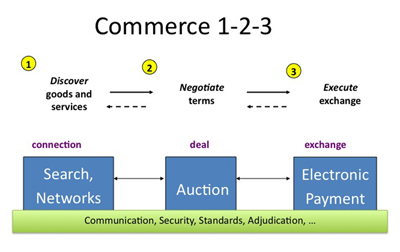EECS 547 (SI 652): Electronic Commerce

Instructor:
Professor Michael Wellman
Coverage
Emerging mechanisms for electronic commerce promise to change the way we conduct business, enforce laws, organize financial institutions, manage our household affairs, and open the doors for automation of increasing ranges of human activity. Developing these mechanisms, and designing them to promote social and individual goals, requires a mastery of concepts in computer science and economics, as well as other fields. In this course, we cover (with technical depth in each) a range of important principles bearing on the design and analysis of electronic commerce mechanisms. Although we address a wide variety of topics and systems, the emphasis is on illustrating fundamental concepts through example, rather than exhaustive survey. Topics include: commerce and networks, exchange and payment protocols, security, auctions and negotiation, automated search, trading agents, privacy.
Textbook(s)
Wellman, Michael, Trading Agents, Draft Manuscript, 2010.
This and other course resources are provided electronically.
Syllabus
The workload for this course falls in several categories (to be elaborated):
- Readings. We will assign readings for most class sessions, from research literature, popular press, custom notes, and other sources. We will also offer suggested supplemental readings and pointers from time to time.
- Problem Sets. There will be four problem sets corresponding to major sections of the course material.
- Exams. An in-class Midterm, and a Final during the regular exam period.
- “How Does It Work?” Each student will investigate (alone or in pairs) some e-commerce technology, process, or issue, and make a brief presentation to the class explaining “behind the scenes” details.
- Trading Agent project. A team project to develop an agent for the Trading Agent Competition (TAC) Ad Auction game.
 MENU
MENU 
